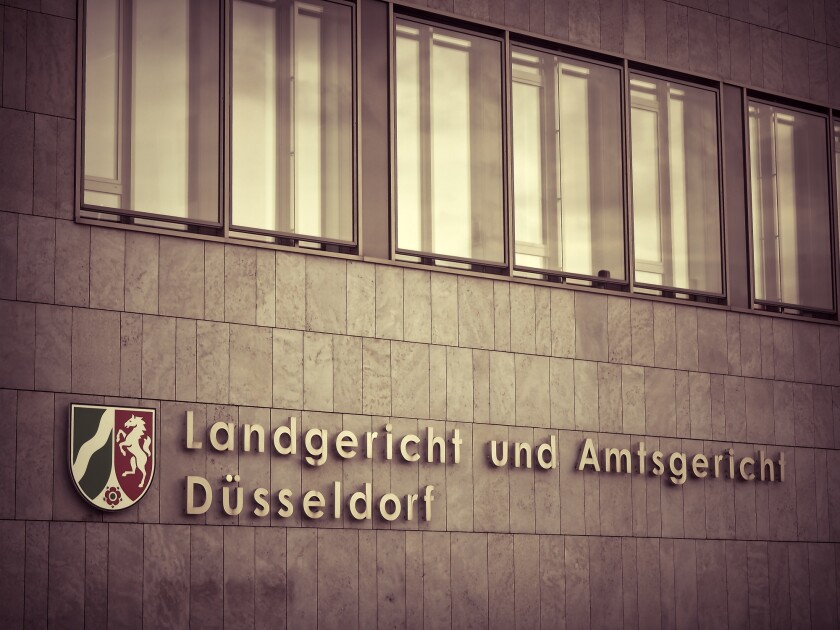In July 2022, the Düsseldorf Regional Court specified the handling of Section 139 (1), sentence 3 of the Patent Act in the field of pharmaceutical litigation, concerning the so-called objection of disproportionality.
The introduction of the objection of disproportionality
The objection of disproportionality was introduced by the Second Act to Simplify and Modernise Patent Law and has been in force since August 2021.
According to the new objection, a claim for injunctive relief is dismissed if the claim would lead to disproportionate hardship for the patent infringer or third parties, without being justified by the exclusive right granted by the patent, due to the circumstances of the case and the requirements of good faith.
What at first sight appears to be a corrective to the German injunctive relief system merely constitutes a clarification of the requirement of good faith (Section 242, German Civil Code) according to the conception of the legislator. In the earlier Heat Exchanger decision of the Federal Court of Justice (judgment of May 10 2016 – X ZR 114/13), good faith was already taken into account in the context of a decision on the granting of an expiry period for the use of a patent.
On the one hand, this legislative clarification aims to counter the problem that patent law objections to the smallest product components can paralyse entire production chains and thus have serious economic consequences.
On the other hand, as mentioned in the explanatory memorandum to the law, the criterion of third-party interests can be used to alleviate a wide range of critical effects of injunctive relief; inter alia, the supply of vital products and the protection of important infrastructure. The Düsseldorf Regional Court analysed these third-party interests in its judgment of July 7 2022 (Case No. 4c O 18/21).
Facts
The British biotechnology company NuCana accused the US pharmaceutical company Gilead of infringing patent EP 2 955 190 with its hepatitis C drugs Epclusa, Harvoni, Sovaldi, and Vosevi. The active ingredient sofosbuvir, patented by NuCana, is contained in Gilead's hepatitis C drugs.
In the infringement proceedings before the Düsseldorf Regional Court, Gilead invoked the objection of disproportionality with reference to patients' interests. The legal validity of the patent had been previously confirmed upon an unsuccessful notice of opposition filed by Gilead against the patent granted to NuCana.
The judgment of the Düsseldorf Regional Court
In its judgment of July 7 2022, the Düsseldorf Regional Court first found an infringement of patent EP 2 955 190 and then dealt with Gilead's alternative objection of disproportionality.
The court had previously refused to stay the proceedings until the conclusion of the opposition appeal proceedings, referring to the negative decision in the opposition proceedings. In the opinion of the court, the compulsory licence action filed in parallel by Gilead also did not justify a stay of the proceedings.
In its judgment, the Düsseldorf Regional Court paid special attention to the relationship between the objection of disproportionality under Section 139 (1), sentence 3 of the Patent Act and the action for compulsory licensing under Section 24 (1) of the Patent Act.
As a result, the court resolutely established the subsidiarity of the objection of disproportionality vis-à-vis a compulsory licence action (in the same manner as Kühnen, Handbuch der Patentverletzung, 14th edition, chap. D, marginal No. 560). Even before the amendment of the law, the court argued in the same line in its judgment of March 9 2017 – 4a O 137/15 (see also the concerns voiced in McGuire, Stellungnahme zum zweiten Patentrechtsmodernisierungsgesetz, p. 13).
According to the court's reasoning, Gilead, as the trustee of its patients' interests, could reasonably be expected to bring a compulsory licensing action primarily before relying on the objection of disproportionality. Consequently, due to the subsidiarity of the objection of disproportionality, the court held that Gilead could not invoke the objection of disproportionality.
The aim of the court when formulating this strict subsidiarity principle was to prevent the circumvention of the requirements for compulsory licensing actions under Section 24 of the Patent Act and to ensure the jurisdiction of the Federal Patent Court.
The Düsseldorf Regional Court reasoned that only the Federal Patent Court has the technical expertise to deal with the technical issues relevant under Section 24 of the Patent Act. The infringement courts, which do not have technical expertise, therefore cannot guarantee the competency required in the context of injunctive relief.
Although Gilead's objection of disproportionality was already dismissed based on subsidiarity, the court additionally pointed out that the necessary requirements for the objection of disproportionality were not met in the present case due to Gilead's conduct. The court highlighted that in the context of the comprehensive balancing of interests – required by Section 139 (1), sentence 3 of the Patent Act – not only third-party interests but also the conduct of the patent infringer have to be taken into account.
The court held that the patent infringer's conduct is of high relevance because it may not "simply hide behind third-party interests". "The patent infringer's conduct must evidence their serious effort to protect patients' interests,” the court stated. “Accordingly, especially in the case of vital medicines, the infringer must choose the least risky strategy to protect patients' interests. That means that he must seek alternative solutions and, if this is not possible due to regulatory requirements, engage in serious negotiations with the patent holder to obtain a licence."
The Düsseldorf Regional Court acknowledged that third-party interests are affected, because certain groups of patients are dependent on Gilead's challenged products due to the lack of alternative medicines. However, the court did not consider these third-party interests to be sufficient to support the objection of disproportionality, because Gilead had not made adequate efforts to obtain a licence.
The court held that sufficient efforts on the part of the infringer require that it first seek a licence on reasonable commercial terms before pursuing the grant of a compulsory licence. Bad faith negotiations, which merely intend to delay the legal dispute or which are carried out in anticipation of a price reduction due to the non-exclusivity of the licence, are insufficient.
The court also noted that the failure to initiate summary proceedings regarding compulsory licensing proceedings under Section 85 of the Patent Act also indicated a lack of serious effort on the part of Gilead.
Consequences of the judgment of the Düsseldorf Regional Court
The judgment of the Düsseldorf Regional Court counters concerns previously expressed in the relevant literature that the new objection of disproportionality would lead to a ‘small compulsory licence’ and the dilution of the right to injunctive relief for patent infringement.
The court also highlighted that the patent infringer's conduct – in particular, its serious effort to obtain a (compulsory) licence – must be considered when conducting the comprehensive weighing of interests required by Section 139 (1), sentence 3 of the Patent Act.
According to the Düsseldorf Regional Court, companies cannot simply invoke patient interests in infringement proceedings without pursuing further action to actualise those interests. Rather, they must make efforts to obtain a commercial licence and, if necessary, even bring an action for the grant of a compulsory licence.
Once these criteria are fulfilled, it remains to be seen to what extent the disproportionality objection will be of significance to ensure use of the patent for a transitional period, as envisaged by the legislator.
From a dogmatic point of view, the Düsseldorf Court's reasoning regarding the subsidiarity of the objection of disproportionality vis-à-vis a compulsory licensing action is persuasive. As the patent holder and the alleged patent infringer act upon the protection of patients’ interests, it is convincing to require the patent infringer to take active steps in the form of (compulsory) licensing requests before considering granting them (temporary) use of the patent via the objection of disproportionality.
However, under certain circumstances, the court's reasoning regarding the subsidiarity of the objection of disproportionality and the trusteeship of the alleged infringer for their patient's interests leads to a problematic outcome. In the opinion of the Düsseldorf Regional Court, patients' interests take second place to the patent holder's interests if the alleged infringer has not sufficiently fulfilled its role as a trustee, even though patients' interests might be severely affected.
Patients' interests are thus directly dependent on the infringer's conduct to secure their interests. Given that the affected patients' interests are also protected by the German Basic Law, this understanding is debatable.
As the new wording of Section 139 (1), sentence 3 of the Patent Act expressly evidences, third-party interests are relevant legal interests and, as such, their effective protection has to be ensured.
Although the refusal of a compulsory licence may seem appropriate in certain cases due to the conduct of the infringer, applying an identical standard in the context of injunctive relief could be highly detrimental to third-party interests. This is especially problematic if third-party interests concern vital or systemically relevant products.
Affected patients will have no possibility of preventing or mitigating the risk, because they will neither be aware of potential patent infringements nor will they have the realistic possibility to influence the infringer to take active steps for their protection at an early stage of potential patent infringement. Thus, there is a risk that the criteria formulated by the court will be detrimental to patients' interests in certain instances, counteracting the legislator's intent.
The dependence of third-party interests on the infringer's conduct, as held by the Düsseldorf Regional Court, will certainly cause further discussions (see, for example, the statement on the draft law of the Second Act to Simplify and Modernise Patent Law by Fabian Hoffmann, judge at the Federal Supreme Court, published on February 19 2021).
It is also likely to prove difficult to derive corresponding rules for practice from the judgment. In particular, the question arises as to when the alleged infringer may seek a (compulsory) licence and, conversely, how long it may rely on its non-infringement and/or legal validity objection to obtain a dismissal of the action.
As a consequence of the judgment of the Düsseldorf Regional Court, the alleged infringer faces a catch-22 situation and has to assess whether to let sleeping dogs lie. If it makes an early effort to obtain a licence, the patent holder may interpret this as an acknowledgement of the possibility of infringement and initiate legal proceedings.
While the reasoning of the court seems practicable in cases of clear patent infringement, concerns will surely arise in cases where the actual infringement of the patent is unclear.












